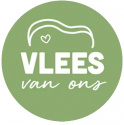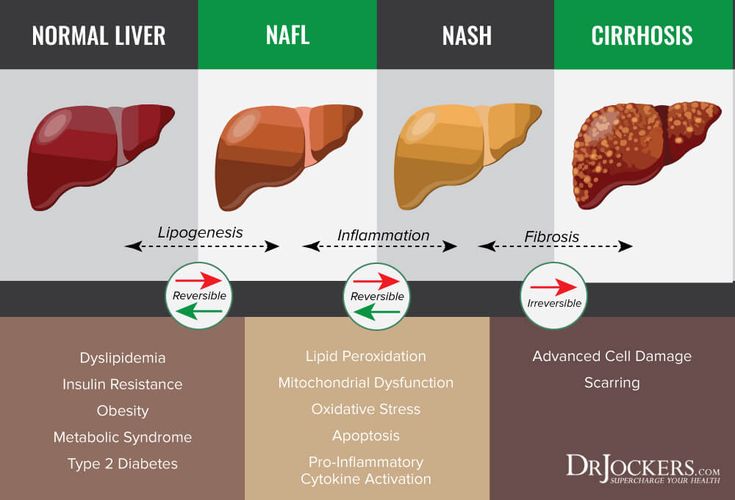Dried liver flakes - 45 g nizozemské sušené hovězí játrové chipsy - 45 g
Liver chips from the Dutch company Modern Native contain 100% beef liver from grass-fed cows. 1 bag is roughly equivalent to 175 g of fresh beef liver. These chips are crispy and without added substances. They contain only sea salt and important vitamins and minerals.
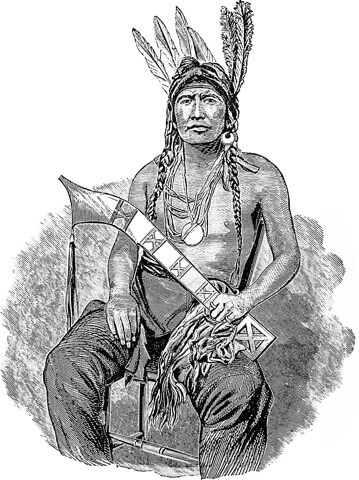 The power of liver chips by Modern Native
The power of liver chips by Modern Native
No food becomes an everyday meal if it doesn't taste good. Liver is considered by some to be the most nutritious food, but few people enjoy it.
After much trial and error, we have managed to make chips from the liver, where the distinctive taste is much more tolerable, the nutrients are maximally used and they have an optimal crunch, without any additives except sea salt.
Ingredients
Nutritional values
Specific peptides, enzymes and by-products + CoQ10.
|
Nutrients |
For 1 dose |
| Vitamin A | 4130 IU (167% RDA*) |
| Vitamin B12 | 19.5 mcg (694% of RDA*) |
| Vitamin B3 | 1.6 mg (99% RDA*) |
| Copper | 1.24 mg (25% of RDA*) |
| Heme iron | 0.9 mg (10% RDA*) |
*RDA = recommended daily allowance
Sources of raw materials
- The ingredients in these food supplements come from grass-fed beef from the Netherlands.
- Because the cows are raised on natural pastures and are well cared for, the nutrients are optimally preserved and you get better quality organ meat.
- The main suppliers of organ meats for Modern Native are Zorg & Natuur (Care & Nature), Vlees van Ons (Meat from Us) and Reestdal Rund (Reestdal Beef).
Why local Dutch farms?
- This business provides a livelihood for local ecologically minded farmers.
- It creates jobs in the sector and thus supports the creation of more organic farms and ranches.
- Where there is more demand, there will be more supply. This will eventually allow the price of quality meat, including organ meat, to fall.
More local organic farmers means less traditional herds (meat production) and happier Dutch cattle.
- Money spent on farms stays in the economy, which has a domino effect and creates more jobs on other local farms.
- Shorter distribution chains reduce unnecessary transport.
- Where cattle are raised according to organic standards, the soil is healthier. Naturally grazing cattle return nutrients to the soil through the urine and manure they excrete.
Why supplement the liver?
The liver is full of vitamins and minerals!
Human nutrition research often demonstrates the concept of "like promotes like". This means that micro and macronutrients in animal organs and tissues support the same organs and tissues in humans.
For example, animal muscle meat promotes the growth and repair of human muscles. Similarly, the nutrients contained in the meat of animal organs support the same organs in the human body.
When it comes to the nutritional value of the liver, most attention is paid to B vitamins and iron. However, each piece of liver contains a number of other vitamins and minerals.
Liver is a good source of the following vitamins and minerals:
- Selenium: Beef liver contains 52% of the daily dose of selenium, which is essential for thyroid function, protects cells from damage and helps the body fight infections.
- Vitamin C: Beef liver contains 2 milligrams of vitamin C, which can boost your immunity.
- Phosphorus: Beef liver contains 50% of the daily amount of phosphorus, the most abundant mineral in the body. Phosphorus helps to create ATP and, in cooperation with B vitamins, supports the function of your muscles, kidneys and your nervous system.
- Choline: chicken liver contains 54.4 milligrams of choline, which is essential for brain health. Specifically, choline is essential for the production of acetylcholine, a neurotransmitter that supports your memory, mood and muscle control.
In very rare cases, some individuals should avoid eating organ meats because they contain large amounts of vitamin A.
A good source of vitamin A is a 100 gram serving of raw liver, which contains a whopping 338% of the daily allowance. In most circumstances this is a good thing (not a bad thing).
Vitamin A is a fat-soluble vitamin that strengthens eyesight, the immune system and reproductive health. In addition, it helps support healthy organs - especially your heart, lungs and kidneys.
While there are many health benefits associated with vitamin A, it is important to remember that vitamin A deficiency is rare and excessive amounts can cause toxicity in the body.
- Consuming high amounts of beta-carotene (found in vitamin A) can cause your skin to turn yellow-orange.
- In addition, pregnant women should not consume too much vitamin A as it can cause birth defects.
- Finally, some medications, such as Accutane, can be toxic when taking vitamin A.
Read more on this topic
Additional parameters
| Category: | Dried organs (offal) |
|---|---|
| Výrobce: | Modern Native B.V. Flevolaan 10, 9501 VG, Stadskanaal, The Netherlands |
| Země původu: | Nizozemsko |
| Proč koupit: | Nizozemská firma, která vyrábí a prodává vysoce kvalitní doplňky stravy. Jsou jimi koncentrované a lyofilizované orgány v kapslích. Jejich posláním je přinášet moudrost našich předků zpět do moderního světa, pro optimální zdraví. |
| Vhodné pro: | Bez lepku-Lactose Free-Soy Free-GMO Free-Keto-Těhotné-Kojící-Děti |
Be the first who will post an article to this item!
Be the first who will post an article to this item!

Our ancestors lived differently from us. Traditional societies have been eating organ meat for centuries. They did it for a reason. Intuitively, they knew it was good for them. They knew that organ meats were the source of the most important nutrients. Similarly, in nature many predators go after organ meat first and muscle meat second.
We hardly eat organs these days. It's an ancient tradition that has faded away. Modern Native's mission is to bring the wisdom of our ancestors back to the modern world for optimal health, strength and happiness.
There is no organ meat like meat
Not all organs are the same. When looking for quality (organ) meat, it is important to check several points:
- 100% grass-fed cattle
- Without hormones
- Pesticide and GMO free
- Animals live stress-free and completely in the wild
The term "grass-fed" doesn't tell the whole story. The cow may be partially outside in the summer eating fresh grass, while most of the time she is in the barn and fed concentrate. 100% grass-fed, that's the Modern Native way of doing things. They only work with farmers whose cattle meet the above points. The organs are obtained from cattle in the Netherlands.
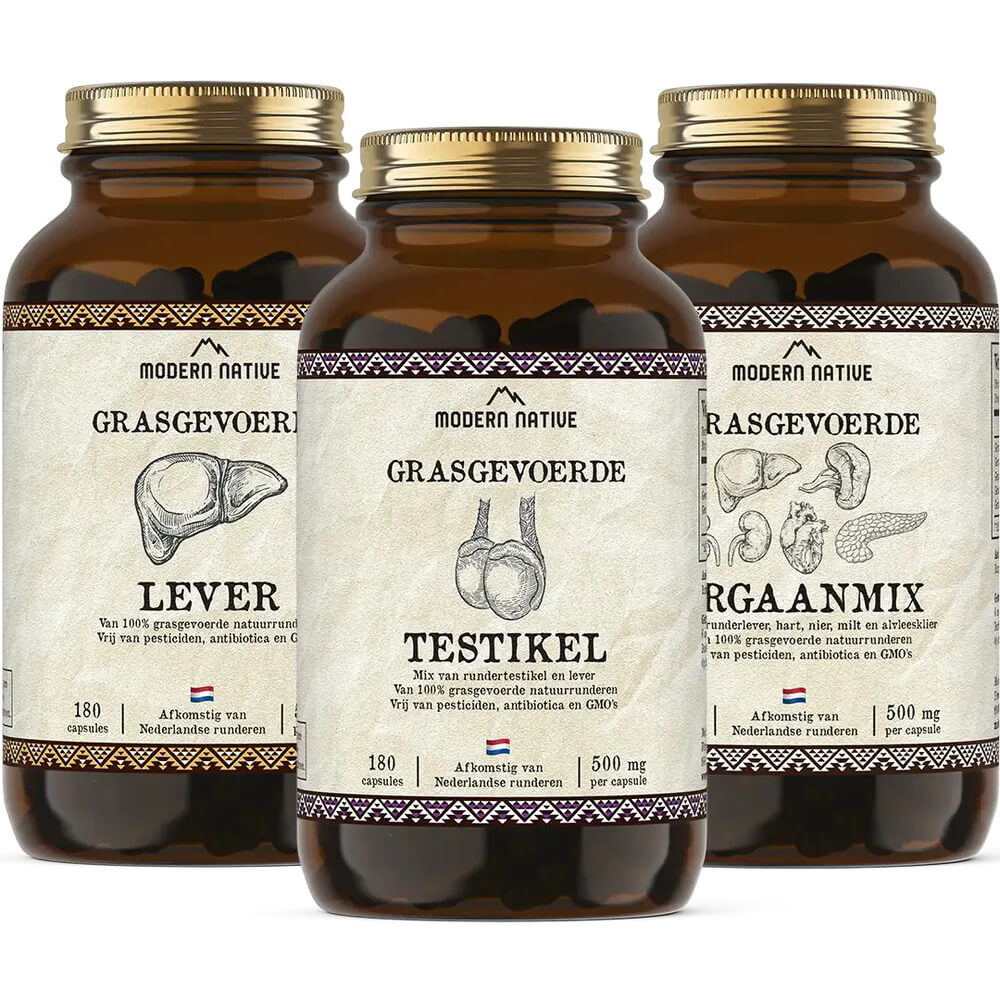
Why local cattle?
- It maintains the health of local natural farmers and creates jobs in the industry, thus creating more natural farmers in the Netherlands.
- Where there is more demand, there will be more supply. This will eventually allow the price of quality meat, including organ meat, to fall.
- More local natural farmers means fewer traditional herds (mass production) and happier cattle.
- Money spent on local farms stays in the economy, which has a domino effect and creates more jobs.
- Shorter distribution chains reduce unnecessary transport.
- When there are more natural livestock, healthier soil is created.
- Naturally grazing cattle return nutrients to the soil through the urine and manure they excrete.
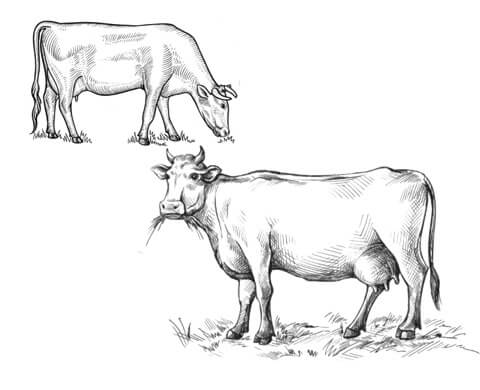
Method for Modern Native accessories
- It comes from 100% grass-fed cattle.
- No hormones.
- Pesticide and GMO free.
- The animals live stress-free and completely in the wild.
Why eat organ meat?
Beloved by our ancestors
Traditional peoples, Native Americans, and ancient ancestors believed that consuming the organs of a healthy animal would promote the health of the individual's organ. They ate "from head to tail", i.e. everything from the animal, because they intuitively knew how nutritionally rich the meat from the organs was.





_small.jpg)
